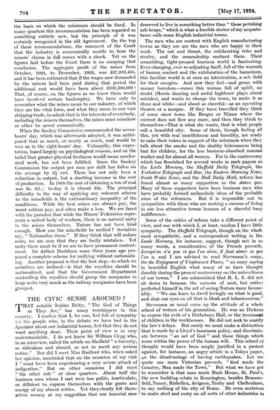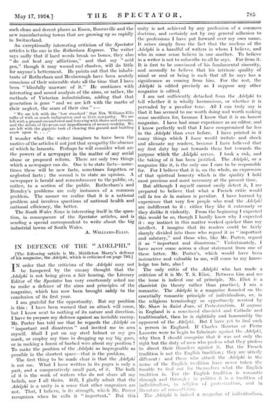THE CIVIC SENSE AROUSED ?
THAT notable Indian Deity, " The God of Things as They Are," has many worshippers in this country. I confess that I, for one, feel full of sympathy for the people who, in the debate we have had in the Spectator about our industrial towns, feel that they do not want anything done. Their point of view is so very understandable. I do not know Sir William Clegg who, in an interview, called the article on Sheffield " a travesty, so ridiculous and absurd, as not to merit any serious notice." Nor did I meet Miss Radford who, when asked her opinion, concluded that on the occasion of my visit I " must have been experiencing a very severe attack of indigestion." But on other occasions I did meet " the other side " at close quarters. About half the business men whom I met were too polite, inarticulate, or diffident to express themselves with the gusto and energy of my absent critics. Yet they clearly felt them- selves uneasy at my suggestion that our imperial race deserved to live in something better than " these perishing ash-heaps," which is what a forcible doctor of my acquain- tance calls some English industrial towns.
The men who are content with English manufacturing towns as they are are the men who are happy in their work. The cut and thrust, the exhilarating risks and rivalry, and the comradeship enchant them. Their scrambling, tight-pressed business world is fascinating. Ever-changing, ever re-adjusting itself, full of the warmth of human contact and the exhilaration of the hazardous, this familiar world is at once an intoxication, a sole field for their energies. And now they feel—and groan with uneasy boredom—comes this woman full of uplift, no doubt (Morris dancing and awful highbrow plays about suicides), and wants to change the town, to make it as clean and white—and about as cheerful—as an operating theatre or a morgue. If they have travelled they think of some show town like Bruges or Nimes where the current does not flow any more, and then they think to themselves—That is what she wants, that is what people call a beautiful city. Some of them, though feeling all this, yet with real unselfishness and humility, are ready to raise their voices in support of the reformers when they talk about the smoke and the shabby hideousness being bad for children, for the less business-absorbed manual worker and for almost all women. For in the controversy which has flourished for several weeks in such papers as the Leeds Mercury, the Sheffield Daily Telegraph, the Yorkshire Telegraph and Star, the Eastern Morning News, South Wales News, and the Hull Daily Mail, reform has found almost as many supporters as the status quo. Many of these supporters have been business men who have probably formed melancholy ideas of the probable aims of the reformers. But it is impossible not to sympathize with those who are making a success of living in our less attractive towns because of a cheerful busy indifference.
Some of the critics of reform take a different point of view, and one with which I, at least, confess I have little sympathy. The Sheffield Telegraph, though on the whore most sympathetic, and a correspondent writing in the Leeds Mercury, for instance, suggest, though not in so many words, a consideration of the French proverb, Lorsqu'on n'a pas ce que l'on airne, it fact aimer ce que l'on a, and I am advised to read Stevenson's essay, On the Enjoyment of Unpleasant Places, " an essay saying in beautiful English what many of us have thought dumbly during the present controversy on the unloveliness of our towns." I am admonished that R. L. S. did not sit down to bemoan the sorrows of soot, but rather perfected himself in the art of seeing Nature more favour- ably. " We can learn to dwell lovingly on what is good, and shut our eyes on all that is bleak and inharmonious."
Stevenson as usual sums up the attitude of a whole school of writers of his generation. He was no Dickens to expose the evils of a Dotheboys Hall, or the treatment of children in the workhouses. He did not seek to scarify the law's delays. But surely we must make a distinction that is made by a Lloyd's insurance policy, and discrimin- ate between " an act of God " and those things which come within the power of the human will. This school of thought would have been amply justified in a protest against, for instance, an angry article in a Tokyo paper, on the disadvantage of having earthquakes. Let me quote one more Victorian proverb, " Cod made the Country, Man made the Town." But what we have got to remember is that man made Bush House, St. Paul's, the new building estate in Kennington, besides Beacons- field, Nancy, Richelieu, Avignon, Tenby and Cheltenham, to say nothing of the city of Rome. He even contrives to make steel and carry on all sorts of other industries in such clean and decent places as Essen, Bournville and the _ . new manufacturing towns that are growing up so rapidly in Switzerland.
An exceptionally interesting criticism of the Spectator articles is the one in the Rotherham, Express. The writer says...sadly that if hard words break no bones, they also " do , not heal any afflictions," and that my " acid pen,". though it may wound and chasten, will do little fOr anyone's betterment. He points out that the inhabi- tants 'of Rotherham and Mexborough have been acutely conscious of their miserable state all the time that I have been ." blissfully unaware of it." He continues with interesting and sound analysis of the aims, or rather, the methods of Victorian industrialism, adding that that generation is gone " and we are left with the marks of their neglect, the scars of their sins" :- " We are left with the low standard' that Mrs. Williams-Ellis talks of with so much indignation and so little s-ympathy. We are left with a ground encumbered and festering with slums and eyesores, and the debris of the iworn-out impedimenta of money-making. We are left with the gigantic task of clearing this ground and building anew upon it. . . ."
I wonder what the writer imagines to have been the motive of the articles if not just that sympathy the absence of which he laments. Perhaps he will consider what are the powerS of *a. newspaper in the matter of any social abuse or proposed reform. There are only two things which a newspaper can do. One is to state facts—some- times these will be new facts, sometimes forgotten or neglected facts ; the second is to state an opinion. A newspaper is herald and remembrancer to the public, or, rather, to a section of the public. Rotherham's and Burnley's problems are only instances of a common problem. The sooner we realize that it is a national problem and involves questions of national health and national efficiency, the better.
The South Wales News is interesting itself in the ques- tion, in consequence of the Spectator articles, and is sending a special correspondent to write about the big industrial towns of South Wales.
A. WILLIAMS-ELLIS.



















































 Previous page
Previous page